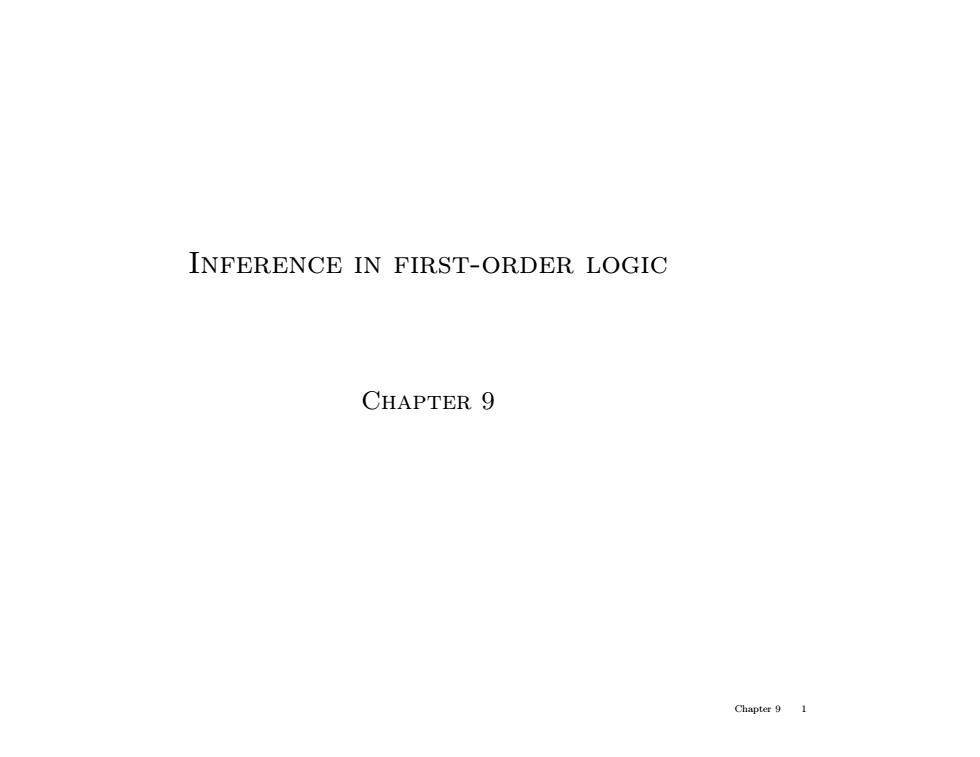
INFERENCE IN FIRST-ORDER LOGIC CHAPTER 9 Chapter 9 1
Inference in first-order logic Chapter 9 Chapter 9 1
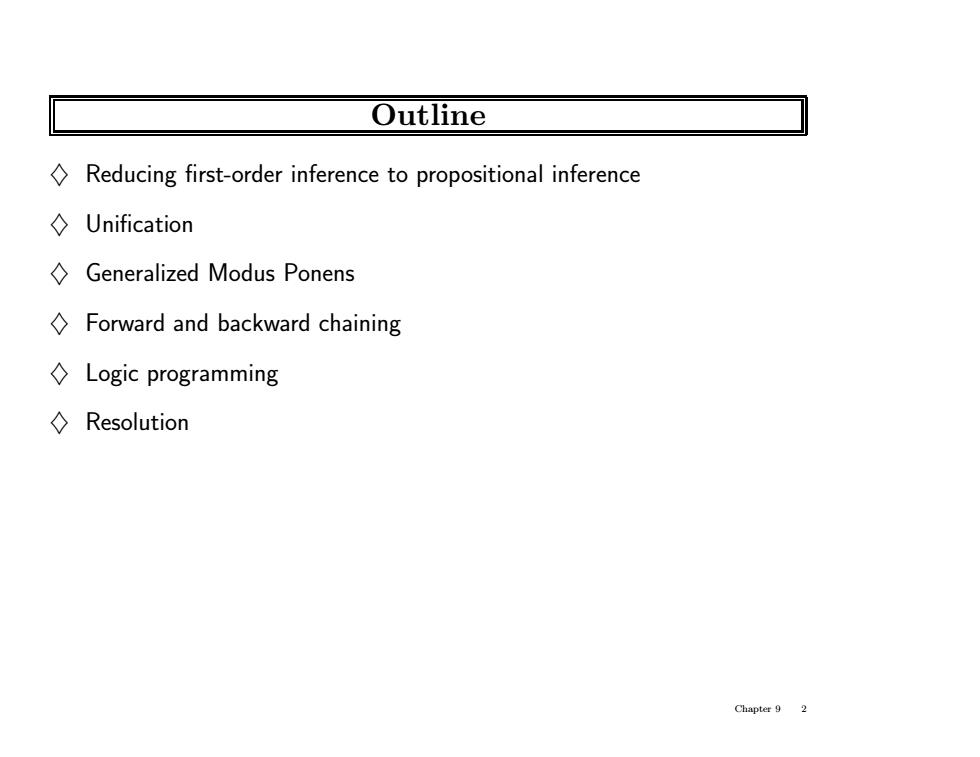
Outline Reducing first-order inference to propositional inference ◇Unification Generalized Modus Ponens Forward and backward chaining ◇Logic programming ◇Resolution Chapter9 2
Outline ♦ Reducing first-order inference to propositional inference ♦ Unification ♦ Generalized Modus Ponens ♦ Forward and backward chaining ♦ Logic programming ♦ Resolution Chapter 9 2
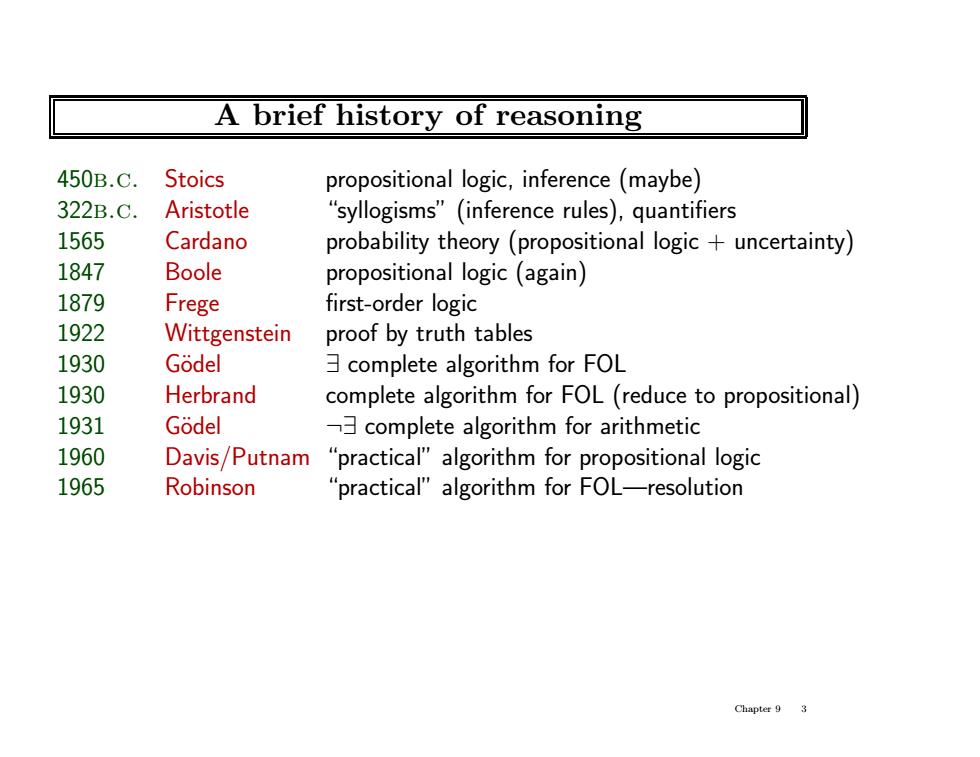
A brief history of reasoning 450B.C. Stoics propositional logic,inference (maybe) 322B.C. Aristotle 'syllogisms"(inference rules),quantifiers 1565 Cardano probability theory(propositional logic uncertainty) 1847 Boole propositional logic (again) 1879 Frege first-order logic 1922 Wittgenstein proof by truth tables 1930 Godel 3complete algorithm for FOL 1930 Herbrand complete algorithm for FOL (reduce to propositional) 1931 Godel complete algorithm for arithmetic 1960 Davis/Putnam "practical"algorithm for propositional logic 1965 Robinson practical"algorithm for FOL-resolution Chapter 9 3
A brief history of reasoning 450b.c. Stoics propositional logic, inference (maybe) 322b.c. Aristotle “syllogisms” (inference rules), quantifiers 1565 Cardano probability theory (propositional logic + uncertainty) 1847 Boole propositional logic (again) 1879 Frege first-order logic 1922 Wittgenstein proof by truth tables 1930 G¨odel ∃ complete algorithm for FOL 1930 Herbrand complete algorithm for FOL (reduce to propositional) 1931 G¨odel ¬∃ complete algorithm for arithmetic 1960 Davis/Putnam “practical” algorithm for propositional logic 1965 Robinson “practical” algorithm for FOL—resolution Chapter 9 3
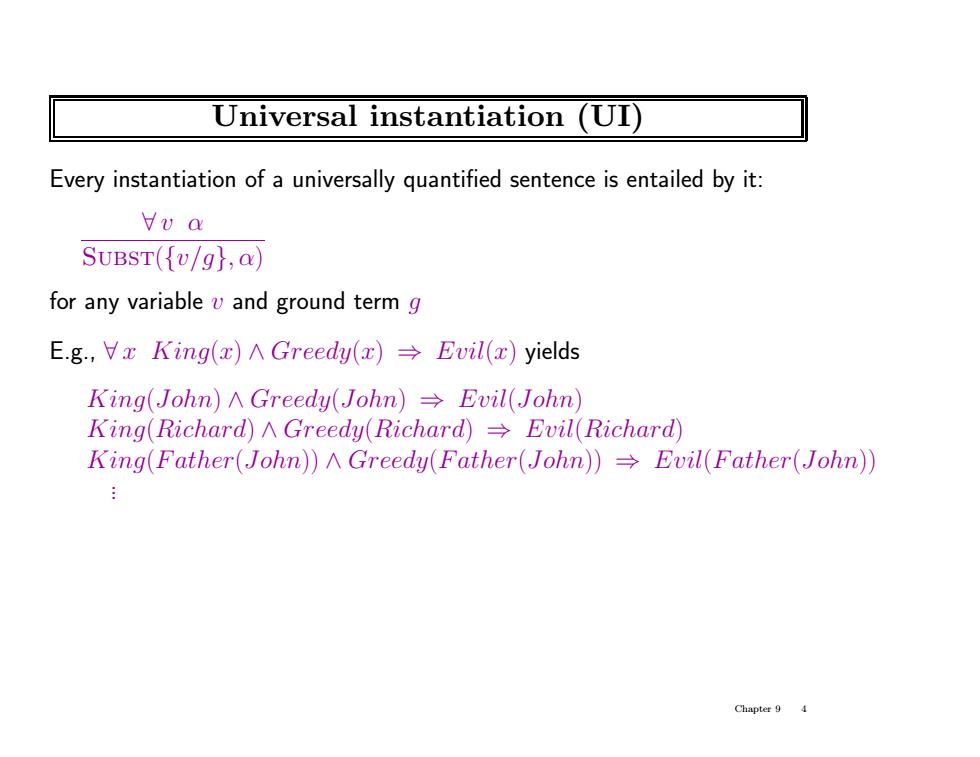
Universal instantiation (UI) Every instantiation of a universally quantified sentence is entailed by it: Vu a SUBST({v/g},a) for any variable v and ground term g Eg,Vx King(x)AGreedy(x)→Evil(x)yields King(John)A Greedy(John)Evil(John) King(Richard)A Greedy(Richard)Evil(Richard) King(Father(John))A Greedy(Father(John))Evil(Father(John)) Chapter 9 4
Universal instantiation (UI) Every instantiation of a universally quantified sentence is entailed by it: ∀ v α Subst({v/g}, α) for any variable v and ground term g E.g., ∀ x King(x) ∧ Greedy(x) ⇒ Evil(x) yields King(John) ∧ Greedy(John) ⇒ Evil(John) King(Richard) ∧ Greedy(Richard) ⇒ Evil(Richard) King(Father(John)) ∧ Greedy(Father(John)) ⇒ Evil(Father(John)) . . . Chapter 9 4
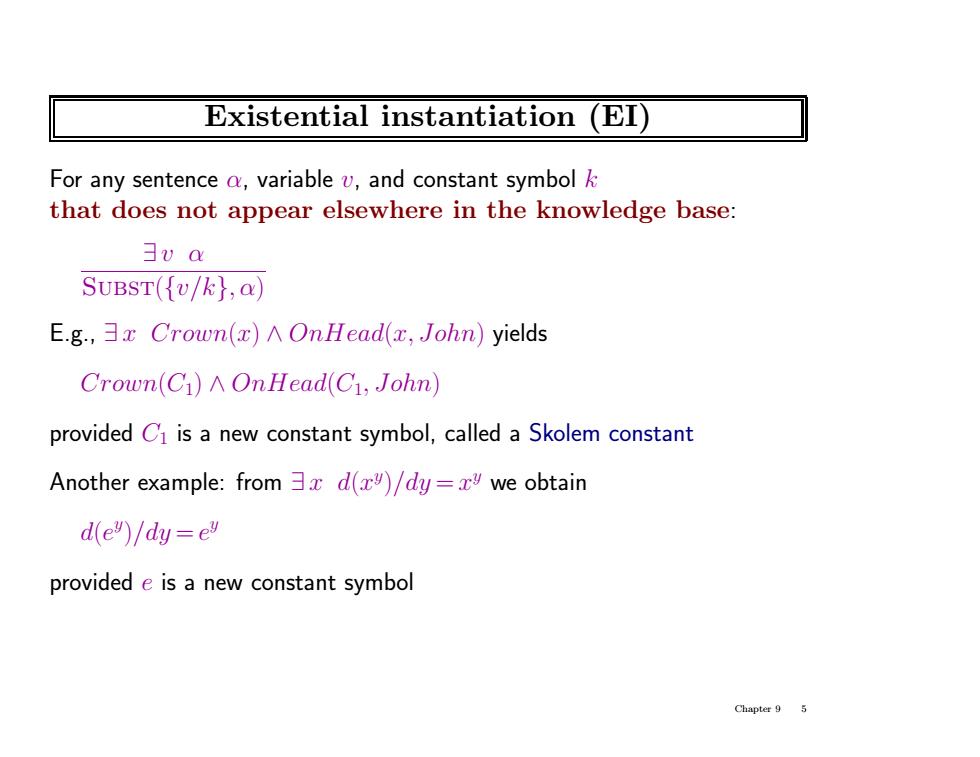
Existential instantiation (EI) For any sentence o,variable v,and constant symbol that does not appear elsewhere in the knowledge base: 3v a SUBST({v/k},a) E.g.,3 Crown(x)AOnHead(x,John)yields Crown(C1)A OnHead(C1,John) provided C1 is a new constant symbol,called a Skolem constant Another example:from 3 d(x)/dy=x we obtain d(e")/dy=e provided e is a new constant symbol Chapter 95
Existential instantiation (EI) For any sentence α, variable v, and constant symbol k that does not appear elsewhere in the knowledge base: ∃ v α Subst({v/k}, α) E.g., ∃ x Crown(x) ∧ OnHead(x, John) yields Crown(C1) ∧ OnHead(C1, John) provided C1 is a new constant symbol, called a Skolem constant Another example: from ∃ x d(xy)/dy = xy we obtain d(ey)/dy = ey provided e is a new constant symbol Chapter 9 5
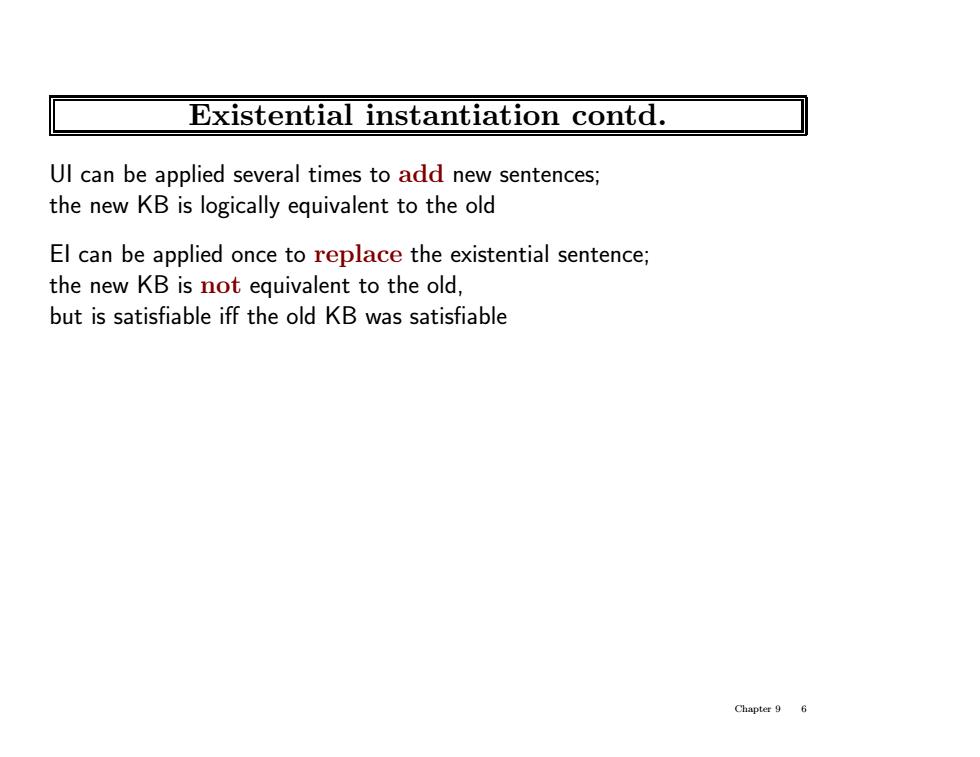
Existential instantiation contd. Ul can be applied several times to add new sentences; the new KB is logically equivalent to the old El can be applied once to replace the existential sentence; the new KB is not equivalent to the old, but is satisfiable iff the old KB was satisfiable Chapter 9 6
Existential instantiation contd. UI can be applied several times to add new sentences; the new KB is logically equivalent to the old EI can be applied once to replace the existential sentence; the new KB is not equivalent to the old, but is satisfiable iff the old KB was satisfiable Chapter 9 6
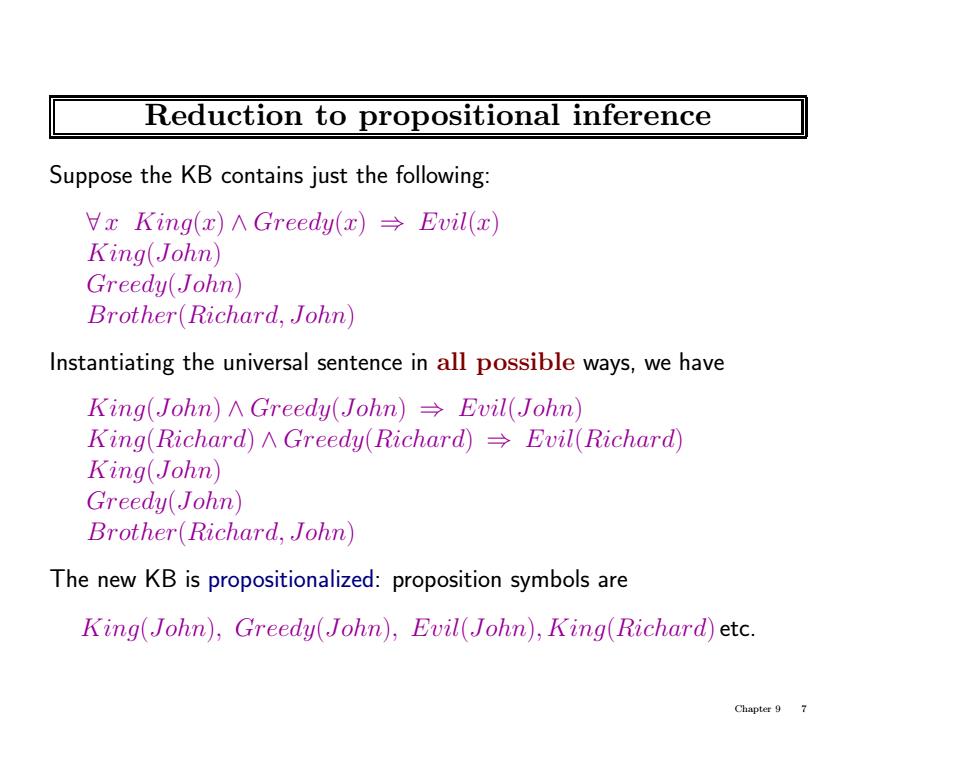
Reduction to propositional inference Suppose the KB contains just the following: Vx King(x)A Greedy(x)Evil(x) King(John) Greedy(John) Brother(Richard,John) Instantiating the universal sentence in all possible ways,we have Kimg(John)∧Greedy(John)→Evil(Johm) King(Richard)A Greedy(Richard)Evil(Richard) King(John) Greedy(John) Brother(Richard,John) The new KB is propositionalized:proposition symbols are King(John),Greedy(John),Evil(John),King(Richard)etc Chapter 9 7
Reduction to propositional inference Suppose the KB contains just the following: ∀ x King(x) ∧ Greedy(x) ⇒ Evil(x) King(John) Greedy(John) Brother(Richard, John) Instantiating the universal sentence in all possible ways, we have King(John) ∧ Greedy(John) ⇒ Evil(John) King(Richard) ∧ Greedy(Richard) ⇒ Evil(Richard) King(John) Greedy(John) Brother(Richard, John) The new KB is propositionalized: proposition symbols are King(John), Greedy(John), Evil(John), King(Richard) etc. Chapter 9 7
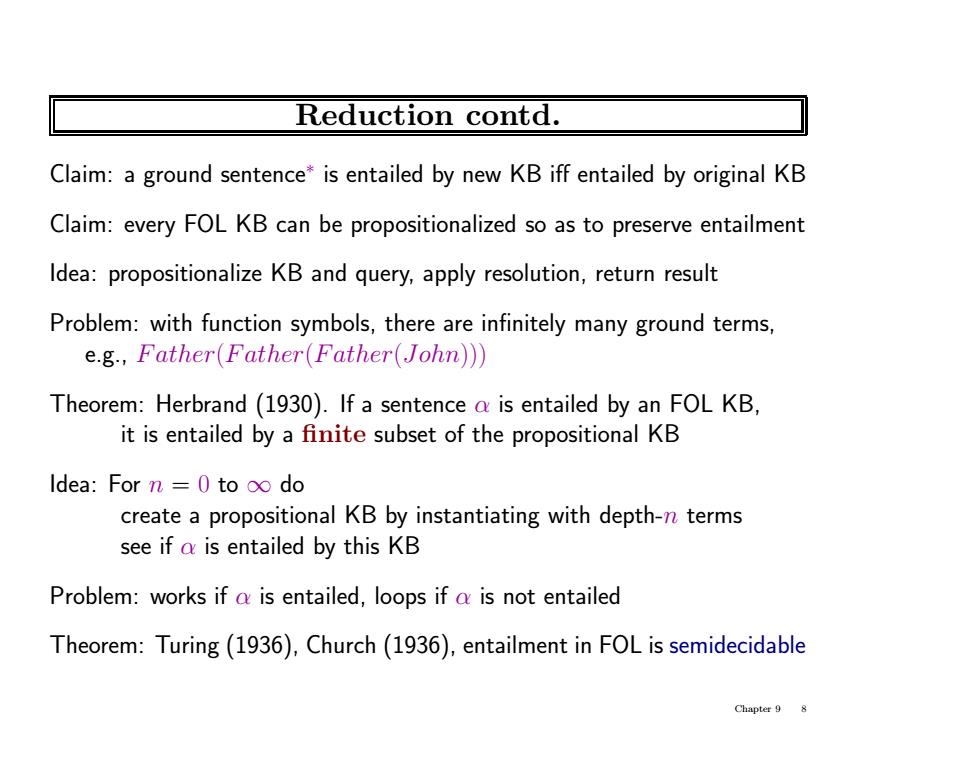
Reduction contd. Claim:a ground sentence*is entailed by new KB iff entailed by original KB Claim:every FOL KB can be propositionalized so as to preserve entailment Idea:propositionalize KB and query,apply resolution,return result Problem:with function symbols,there are infinitely many ground terms, e.g.,Father(Father(Father(John)) Theorem:Herbrand(1930).If a sentence a is entailed by an FOL KB, it is entailed by a finite subset of the propositional KB ldea:For n=0 to oo do create a propositional KB by instantiating with depth-n terms see if a is entailed by this KB Problem:works if a is entailed,loops if a is not entailed Theorem:Turing(1936),Church(1936),entailment in FOL is semidecidable Chapter 9 8
Reduction contd. Claim: a ground sentence∗ is entailed by new KB iff entailed by original KB Claim: every FOL KB can be propositionalized so as to preserve entailment Idea: propositionalize KB and query, apply resolution, return result Problem: with function symbols, there are infinitely many ground terms, e.g., Father(Father(Father(John))) Theorem: Herbrand (1930). If a sentence α is entailed by an FOL KB, it is entailed by a finite subset of the propositional KB Idea: For n = 0 to ∞ do create a propositional KB by instantiating with depth-n terms see if α is entailed by this KB Problem: works if α is entailed, loops if α is not entailed Theorem: Turing (1936), Church (1936), entailment in FOL is semidecidable Chapter 9 8
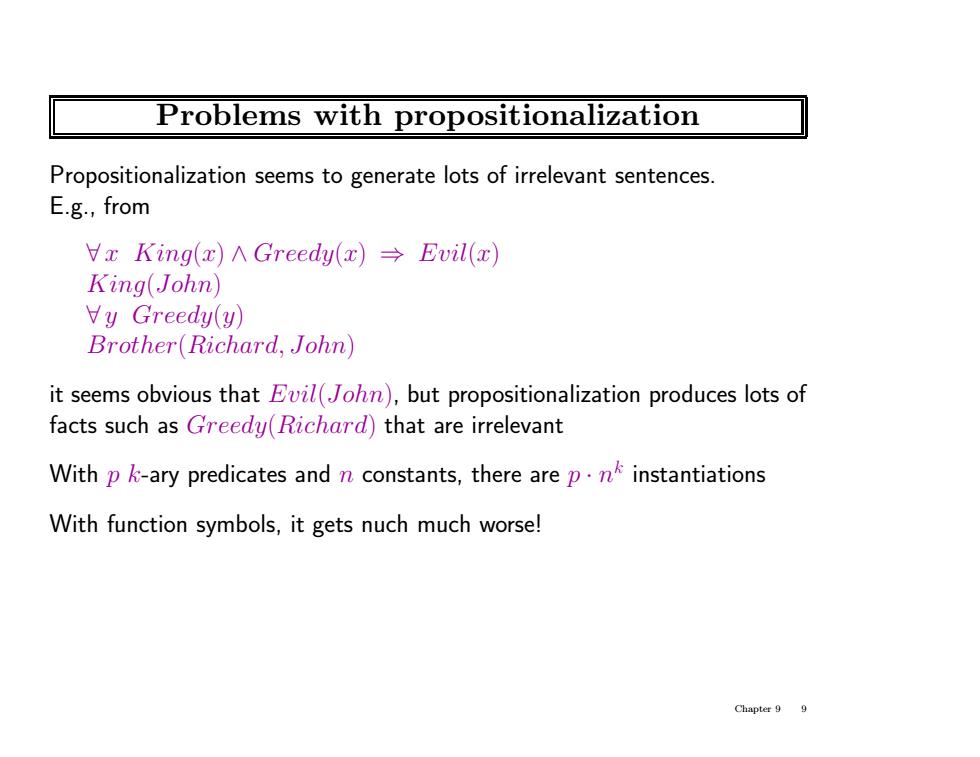
Problems with propositionalization Propositionalization seems to generate lots of irrelevant sentences. E.g.,from Vx King(x)∧Greedy(x)→Evil(c) King(John) Vy Greedy(y) Brother(Richard,John) it seems obvious that Evil(John),but propositionalization produces lots of facts such as Greedy(Richard)that are irrelevant With p k-ary predicates and n constants,there are p.n instantiations With function symbols,it gets nuch much worse! Chapter 99
Problems with propositionalization Propositionalization seems to generate lots of irrelevant sentences. E.g., from ∀ x King(x) ∧ Greedy(x) ⇒ Evil(x) King(John) ∀ y Greedy(y) Brother(Richard, John) it seems obvious that Evil(John), but propositionalization produces lots of facts such as Greedy(Richard) that are irrelevant With p k-ary predicates and n constants, there are p · nk instantiations With function symbols, it gets nuch much worse! Chapter 9 9
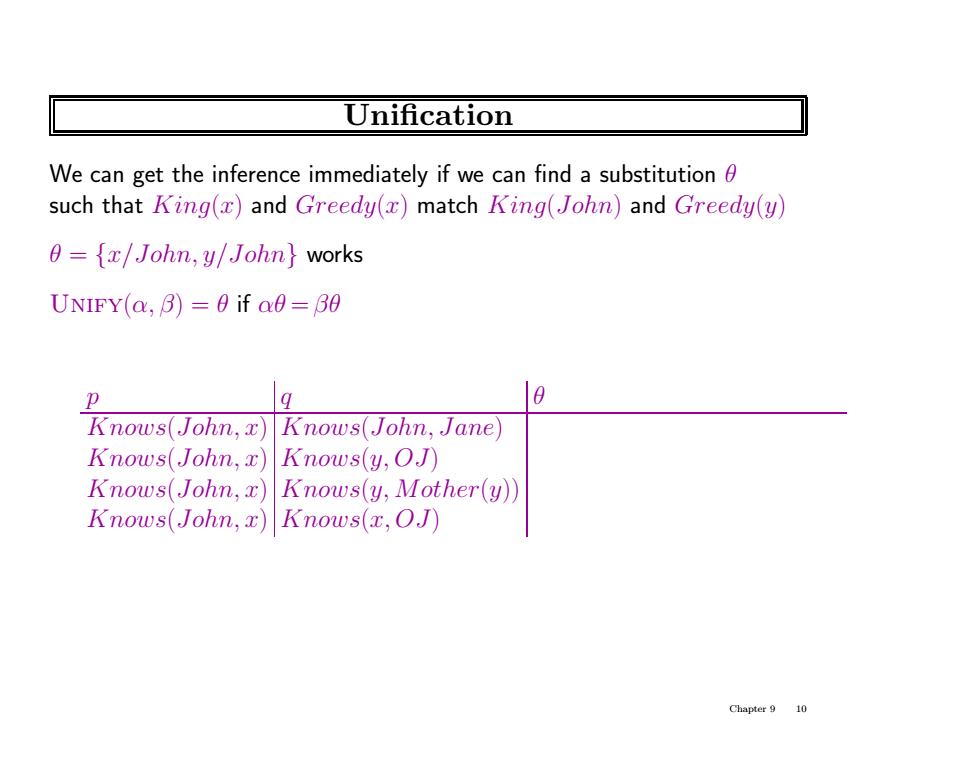
Unification We can get the inference immediately if we can find a substitution 0 such that King(x)and Greedy(x)match King(John)and Greedy(y) 0={/John,y/John}works UNIFY(a,B)=0 if a0=30 le Knows(John,x)Knows(John,Jane) Knows(John,x) Knows(y,OJ) Knows(John,x) Knows(y,Mother(y)】 Knows(John,x) Knows(x,OJ) Chapter 9 10
Unification We can get the inference immediately if we can find a substitution θ such that King(x) and Greedy(x) match King(John) and Greedy(y) θ = {x/John, y/John} works Unify(α, β) = θ if αθ = βθ p q θ Knows(John, x) Knows(John, Jane) Knows(John, x) Knows(y, OJ) Knows(John, x) Knows(y, Mother(y)) Knows(John, x) Knows(x, OJ) Chapter 9 10